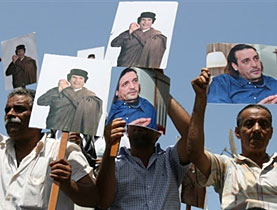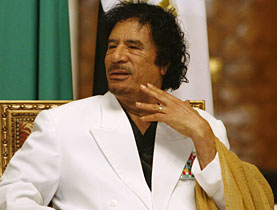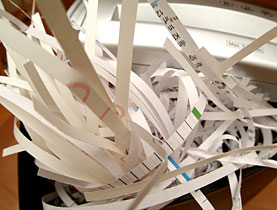Gaddafi’s revenge riles Swiss press

Libyan "revenge" against Switzerland in response to the detention of Hannibal Gaddafi in Geneva last week is in the spotlight of the Swiss press.
The newspapers have taken the opportunity to look at the nature of the Libyan regime – and Moammar Gaddafi’s system of government is shown in a bad light.
The Swiss foreign ministry reported on Wednesday that Libya had taken “worrying retaliatory measures”, including the closure of Swiss businesses in the country and the detention of two Swiss citizens.
Hannibal and his heavily pregnant wife Aline were detained in a Geneva hotel after two of their servants complained of severe mistreatment.
His sister, Aisha, warned last week that Libya would respond on the principle of “an eye for an eye, and a tooth for a tooth”, as Le Temps of Geneva recalls.
“Gaddafi takes Swiss hostages!” declares the tabloid Blick and goes on to ask: “Does this desert dictator think he can do what he wants with Switzerland?”
“The Gaddafi clan takes revenge,” is the headline in Bern’s Bund newspaper.
“In Libya the Gaddafis see to it that might prevails,” says the Tages-Anzeiger of Zurich. It goes on to describe Libya as “a paradise for shadowy foreign businessmen” who appreciate the fact that there are “no clear laws”.
In its editorial the paper says that Gaddafi is reacting “as if the law was not the same for everyone in Switzerland”.
For the Lausanne-based Le Matin too, the action taken by the Geneva police against Hannibal deserves praise. “It’s easier to pick up a few Roma beggars under a bridge and dump them at the border than to arrest the son of a dictator in a five star hotel.”
“We would have been glad to avoid the retaliatory measures taken by Libya,” it says. “But that’s the price to pay if we want to remain credible. If we want to make sure our laws are respected by all, including the rich tourists so beloved by our luxury shops and hotels.”
Le Matin has its own take on the situation inside Libya. “Even the Gaddafi family knows it is not the Swiss police who have humiliated Libya. It’s their little brother who has tarnished the image of their country. His older brother, Seif al-Islam, a good communicator who is working seriously to modernise and open up the country, can’t be at all pleased. Let’s hope he’ll find a way to mend fences with Bern.”
Dictatorship
The Bund says that despite the fact that Washington has dropped Libya from its list of rogue states, the country remains a dictatorship. “Democracy, division of power and human rights are foreign words there.”
Le Temps describes the conflict as one of “values and cultures”. It says that although “Arab oil potentates” seem to get away with many of their “escapades” in western capitals, the violence of which Hannibal Gaddafi has been accused is a different matter.
“The tacitly accepted impunity accorded to the rich and powerful no longer applies when it comes to human rights and respect for women,” the paper comments.
It points out that disregard for women is one of the West’s strongest criticisms against Islam.
Blackmail
Given their hard words against the regime, it is hardly surprising that the papers do not want the Swiss to bow to Libyan pressure.
“It would be too high a price to deny democratic principles for the sake of a short-term success,” says the Bund.
The Tages-Anzeiger takes the same line for more pragmatic reasons.
It is adamant that even the fact that two Swiss citizens have been “effectively taken hostage” should not make any difference, since this would only expose Switzerland to similar pressure should similar circumstances arise again.
“Gaddafi has shown for decades that he is incapable of learning, and he certainly shows no signs of improving,” it says. “Switzerland shouldn’t make itself dependent on such an unpredictable country.”
Several papers examine the nature of Switzerland’s dependence on Libyan oil, and all play down the importance of Tripoli’s economic threats.
Blick quotes Rolf Hartl, managing director of the Swiss Oil Association, who says on the one hand that Switzerland has plenty of reserves, and on the other that it would be “absurd” for Libya to turn off the oil tap, since the Libyan state owns two refineries and over 300 filling stations in Switzerland and would be damaging its own interests.
Nevertheless, the Tages-Anzeiger has some advice about the Swiss energy supply.
“Gaddafi’s act of revenge should encourage us to purchase our oil elsewhere instead of concentrating it so one-sidedly,” it comments.
swissinfo, Julia Slater
Libya has a population of just under six million.
Libya is Switzerland’s second-largest trading partner in Africa (after South Africa) and in 2006 provided 49% of Swiss crude oil imports, according to the State Secretariat for Economic Affairs (Seco).
In 2007 imports from Libya, consisting almost exclusively of petroleum, dropped by 1.1% to SFr1.66 billion.
In 2007 exports, mainly in the machinery and pharmaceutical industries, rose by 16.3% to SFr278.6 million.
The first Swiss merchants settled in Libya at the end of the 19th century. Switzerland recognised the new state immediately after the Declaration of Independence in 1951. Around a dozen Swiss citizens were living in Libya at that time.
The oil companies brought more Swiss geologists, engineers and experts to the country and Swiss lawyers, such as Eduard Zellweger (1901-1975), acted as advisors to the government.
From 1962 the Swiss embassy in Tunisia represented national interests in Libya. In 1965 a consulate was opened in the Libyan capital Tripoli, followed by an embassy in 1968.
Today Libya is an important economic partner of Switzerland and its main supplier of crude oil. Political contacts between the two countries also returned to normal after the UN-imposed sanctions were lifted in 2003. Libya is one of Switzerland’s five key export markets on the African continent.
The lawyer of the Moroccan servant allegedly mistreated by the Gaddafi couple says his client’s mother was detained at Tripoli airport on July 14 as she was about to fly home.
The lawyer described the person who detained her as a “soldier in civilian clothes working for Hannibal”.
He said he had appealed among others to the United Nations who would take the matter further.

In compliance with the JTI standards
More: SWI swissinfo.ch certified by the Journalism Trust Initiative



You can find an overview of ongoing debates with our journalists here . Please join us!
If you want to start a conversation about a topic raised in this article or want to report factual errors, email us at english@swissinfo.ch.